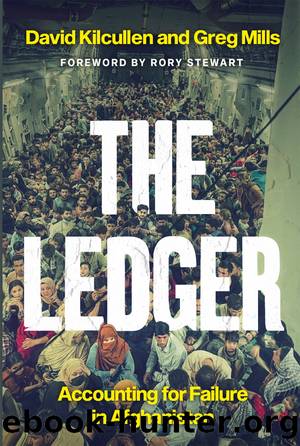The Ledger by David Kilcullen

Author:David Kilcullen
Language: eng
Format: epub
Publisher: Hurst Publishers
Published: 2021-11-29T00:00:00+00:00
Viewed in hindsight, Bernard Fallâs insights about Vietnam are remarkable. The late Colin Powell wrote in his own autobiography: âI recently reread Bernard Fallâs book on Vietnam, Street Without Joy. Fall makes painfully clear that we had almost no understanding of what we had gotten ourselves into. I cannot help thinking that if President Kennedy or President Johnson had spent a quiet weekend at Camp David reading that perceptive book, they would have returned to the White House Monday morning and immediately started to figure out a way to extricate ourselves from the quicksand of Vietnam.â74
Now there is no excuse: the lessons are readily available. Results in counter-insurgency, Fall argued, could be measured only over many years. Success, moreover, required a capable host government that could ultimately carry the burden on its own. Fallâs contemporary David Galulaâa French military officer who had served in Algeria and been held prisoner by Maoâs forces in China, before commanding troops on counterinsurgency operations in two different districts of Algeriaânoted that victory in counter-insurgency demanded not only the military defeat of the guerrilla component of an insurgent movement, but also a permanent separation between the population and insurgentâa separation willingly undertaken in concert with a credible and legitimate government. As Galula put it, âA victory is not (just) the destruction in a given area of the insurgentâs forces and his political organization. It is that plus the permanent isolation of the insurgent from the population, isolation not enforced upon the population but maintained by and with the population.â75
These lessons ring true today but implementing them is as hard as ever; indeed, it may be impossible. Individuals working in reconstruction and stabilisation roles need the ability both to appreciate and draw together the strands of security, development, politics and economics, where the emphasis is on personalcharisma and cultural and local knowledge, coupled with an ability to understand the array of incentives shaping local actions, and to listen attentively rather than prescribe.
The role of political advisers (POLADs) in Afghanistan was challenging, given the absence of any clear-cut political strategy as evidenced in progress with talks, internally or regionally. The development cadres were similarly misdirected. Mistakes compound in such environments when there is so much at stake. Moreover, aid programmes can crowd out private-sector economic development when controlled by donors who do not either understand, or like, business.
Combined with a pathological tendency to analyse rather than do, attempts to create jobs in Afghanistan (as elsewhere) followed a pattern: a bright idea followed by a scoping study, normally backed up by a consultative process, an evaluation process producing a commission to conduct fieldwork to deliver a detailed report âworkshoppedâ along the way by various representative constituents and stakeholders, then appraised by peer reviewers in âdeep-dive longitudinalâ processes. The product would then be matched by a business plan which, normally after at least one turnover of donor staff, is condemned to gather dust on a shelf, forgotten until the idea is revived later and the process starts again.76
Experts spoke
Download
This site does not store any files on its server. We only index and link to content provided by other sites. Please contact the content providers to delete copyright contents if any and email us, we'll remove relevant links or contents immediately.
| Arms Control | Diplomacy |
| Security | Trades & Tariffs |
| Treaties | African |
| Asian | Australian & Oceanian |
| Canadian | Caribbean & Latin American |
| European | Middle Eastern |
| Russian & Former Soviet Union |
The Secret History by Donna Tartt(19085)
The Social Justice Warrior Handbook by Lisa De Pasquale(12190)
Thirteen Reasons Why by Jay Asher(8909)
This Is How You Lose Her by Junot Diaz(6885)
Weapons of Math Destruction by Cathy O'Neil(6279)
Zero to One by Peter Thiel(5801)
Beartown by Fredrik Backman(5751)
The Myth of the Strong Leader by Archie Brown(5507)
The Fire Next Time by James Baldwin(5442)
How Democracies Die by Steven Levitsky & Daniel Ziblatt(5218)
Promise Me, Dad by Joe Biden(5153)
Stone's Rules by Roger Stone(5087)
A Higher Loyalty: Truth, Lies, and Leadership by James Comey(4960)
100 Deadly Skills by Clint Emerson(4924)
Rise and Kill First by Ronen Bergman(4788)
Secrecy World by Jake Bernstein(4752)
The David Icke Guide to the Global Conspiracy (and how to end it) by David Icke(4717)
The Farm by Tom Rob Smith(4507)
The Doomsday Machine by Daniel Ellsberg(4490)
